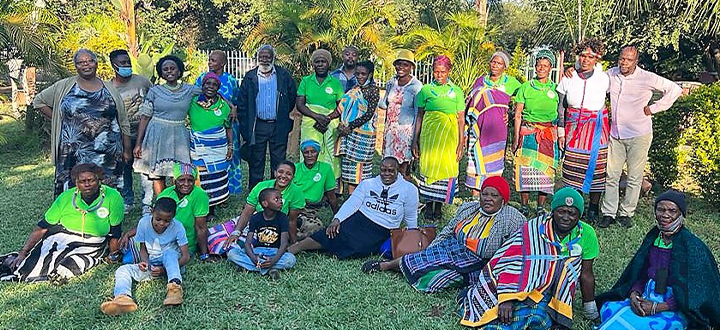News & Events
Unisans contribute lessons towards shaping futures with eco-systemic living
At 12:00 on 9 July, Unisa staff members (from academic and professional support) presented a joint paper at an international conference on systems thinking. The paper was entitled: “Towards eco-systemic living: Learning with indigenous leaders in Africa and Indonesia through a community of practice: Implications for climate change and pandemics”.

Vho Pat Lethole, Project Leader (standing, far left); Dr Enid Pitsoane, Vho Hector Mothudi, Vho Fhatuwani Makahane – Gauteng Region with the Tshidzivhe and Bamboo Projects participants during focus group in Thohoyandou, VENDA
The paper was based on the community engagement project led by Vho-Patricia Lethole and Professor Janet McIntyre, with the support of Professors Norma Romm and Akwasi Arko-Achemfuor, including colleague Dr Enid Pitsoane, and indigenous leader Vho-Mphatheleni Makaulule at the forefront of discussion and action in the community of Tshidzivhe.
The paper was presented in the Balancing Individualism and Collectivism Special Integration Group at the virtual International Society for Systems Sciences (ISSS) Conference, with the theme “Advances in Systems Sciences and Systems Practice: 66th Annual Meeting of the International Society for the Systems Sciences” (7 – 11 July).
The conference mentioned above was organised by Professor Janet McIntyre (honorary professor extraordinaire at Unisa and associate professor at Flinders University) and hosted by Professor Roelien Goede (President of the International Society for the Systems Sciences from North-West University).
The presenters were as follows: Prof Janet McIntyre (who publishes as McIntyre-Mills) for design and facilitation with Vho-Mphathe Makaulule (academic, custodian, and community leader of Dzomo la mupo at Venda in Limpopo Province), Vho-Patricia Lethole (project leader and Unisa centre manager: Gauteng Region), Prof Norma Romm (Professor in Department of Adult Community and Continuing Education at Unisa, mentor, and co-facilitator) and Prof Ida Widianingsih (academic and leader, Universitas Padjadjaran).
From Venda, in the Limpopo Province of South Africa, the Tshidzivhe Project and Bamboo cooperative have been set up as part of an action research project. The aim is to learn from indigenous leaders and to raise awareness and capabilities for cooperative social enterprises in line with indigenous local knowledge systems, and to assess the process. The project responds to the UN policy to address food, energy, and water security and the need to redress high rates of urbanisation and the cascading impact on human security (UN Urbanisation Report, 2014, UN 2030 Agenda for Sustainable Development, 2015, UN Sendai Risk Platform, 2030, IPPC, 2020). In terms of innovation, we draw on and adapt the principle of the “One Village, One Product approach” and “One Village, Many Enterprises”, decreed by President Jokowi (2014) in Indonesia, to enable working across sites to facilitate the mapping of opportunities and the cross-fertilisation of ideas. We use a gender mainstreaming and relational multispecies lens to support wellbeing.
Rationale: The rationale is that forests need to be protected as they are “the lungs of the planet”, to cite Chief Raoni, Nobel Peace Prize nominee for 2020.
Methodology: We use participatory action research and mixed methods. The focus is on values, perspectives, and ways to make a difference through addressing a range of practical concerns, such as food, energy, and water security. Ontologically our perspective is shaped by recognising kinship with nature, as expressed by indigenous custodians.
* By Ms Pat Lethole, Regional Centre Manager: Ekurhuleni, Gauteng Region
Publish date: 2022-08-09 00:00:00.0

